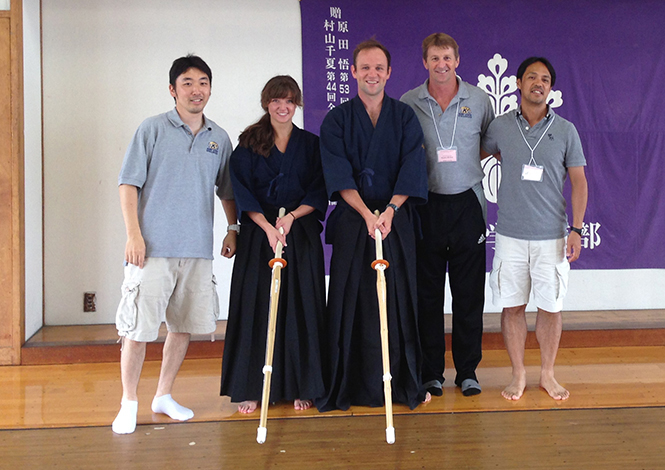Summer institute shows importance of sports in other cultures
Photo by Takahiro Sato, Kathryn Damicone, Collin Epstein, Stephen Mitchell, Tsuyoshi Matsumoto, Associate professor at the University of Tsukuba. Damincone and Epstein are in the traditional clothing for the sport of Kendo.
August 27, 2013
Traveling more than 6,000 miles across the Pacific Ocean, a group of Kent State faculty members and students made their way abroad to spend a week in Japan from July 12 to 19 as part of the Tsukuba Summer Institute.
“Part of our university’s strategic plan is to try and adopt a more global perspective in terms of our programs and what we’re able to offer to students,” said Stephen Mitchell, a professor in the School of Education, Health and Human Services.
Mitchell and Takahiro Sato, an assistant professor in the School of Education, Health and Human Services, created an exchange program with the University of Tsukuba.
“The program is a good opportunity for students to see a different culture and to meet students from other parts of the world,” Mitchell said. “It’s also a good opportunity for faculty to interact with other faculty members from other institutions in different countries.”
Being from Japan, Sato used his hometown connection to establish the exchange program. His goal: to teach physical education majors about the culture sports and physical education in the Japanese culture.
Senior physical education major Kathryn Damicone and Collin Epstein, a curriculum and instruction graduate student, were eager to expand their knowledge using the study abroad opportunity.
“I felt grateful for the opportunity to travel to Japan,” Damicone said. “I received a scholarship to go which really set it in stone for me.”
The students realized, however, they would have to get adjusted to a whole new culture and language.
“I’m a vegetarian, had no idea what I was going to eat let alone the language barrier,” Damicone said. “Just had to go in feet first!”
After a 14-hour flight from Chicago to Tokyo, Damicone and Epstein met students and faculty from Japan and 14 other countries at the University of Tsukuba.
Mitchell and Sato gave lectures on coaching and physical education.
The students rode bikes, played soccer and most spoke English well, Epstein said. Mitchell even pointed out they had a Starbucks on campus.
The culture shock came when Epstein and Damicone realized the Japanese culture is centrally focused on tradition when it comes to sports, rather than competition.
“They’re all very polite and respectable, focusing on the sport as a whole,” Epstein said. He explained how teaching young athletes values like teamwork at a young age like this could help them grow up more respectable.
After their trip to Japan, the two students said they’d recommend the program to anyone.
“I made lifelong friends from all around the world,” Damicone said. “I still stay in contact with my new friends and professors and wouldn’t change it for anything!”
As for Mitchell and Sato, they plan to expand the program next summer to include more students and to other physical education majors, such as exercise science and athletic training. They believe it’s important to establish connections with abroad universities.
“If we are able to be involved with institutions from across the world, it will certainly will raise our profile and enable us to provide opportunities for students to experience things that they otherwise wouldn’t experience,” Mitchell said.
Contact Brandon Koziol at [email protected] u.












